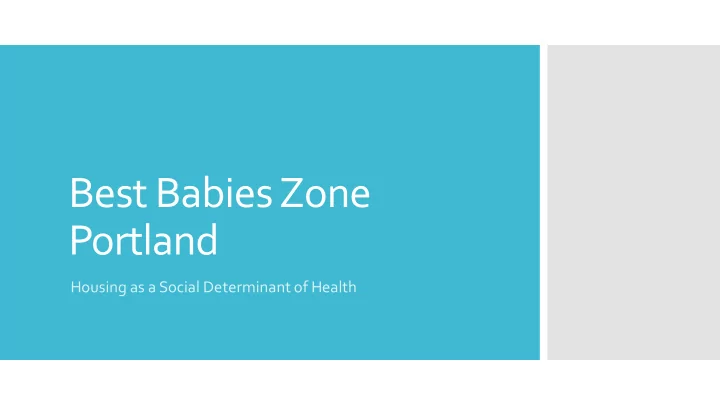

Best Babies Zone Portland Housing as a Social Determinant of Health
Nick Sauvie Executive Director ROSE Community Development nick@rosecdc.org 503-788-8052 x16
Majority of poor households in the US pay more than half of their income for housing Recent Portland State University report counted 38,000 people in Why housing? the Portland metro area as homeless or at high risk Nonprofit leaders across all sectors in the US see lack of affordable housing as the most critical need in their communities The US lost 60% of its affordable housing stock from 2010-2016
Revitalize Outer South East Portland What is a CDC? Affordable housing for rent and for sale Nonprofit organization or housing Resident services authority Lents Youth Initiative Develops housing and other real estate Partnerships to serve community organizations, child care Roots in the community providers, and people with physical handicaps, mental illness, and addictions Advocacy
Epigenetics & first thousand days Place-based Resident-led Multi-sector 11 zones: Chicago, Cleveland, Fresno, Indianapolis, Kalamazoo, Kansas City, Milwaukee, New York City, Oakland, Portland, & Wake County NC
Low Birth Weight Density, Multnomah County
97266 zip code of SE Portland High incidence of low birthweight, infant mortality, & teen birth 10% annual rent increases Home prices increased 113% in six years
Asian Pacific American Network of Oregon (APANO) African Family Holistic Health Organization Black Parent Initiative Baby Booster Earl Boyles SUN School/IRCO Partners Familias En Accion Future Generations Collaborative Healthy Birth Initiative/Multnomah County Health Department Portland Homeless Family Solutions Zenger Farm
Applied to two new affordable housing developments that opened in 2019 – Orchards of 82 nd & Woody Guthrie Place Families who are pregnant & have babies under age 2 go to the top of the list Baby Booster Educate partners about affordable housing process Housing Reduce barriers to housing access Rent subsidies through Project Based Vouchers from Home Preference Forward, Multnomah County’s housing authority Transit-oriented development Public land acquisition by Metro and Prosper Portland
Families placed in housing Placements by partners African American – 32% Asian – 17% AFFHO – 4 (11.8%) Latinx – 11% APANO – 5 (14.7%) It’s working! Native American – 8% FGC – 4 (11.8%) White – 26% HBI – 13 (38.2%) < 30% Area Median Income PHFS – 2 (5.9%) – 60% ROSE – 6 (17.6%) Female Heads of Households – 72%
Recommend
More recommend